Search
Did you mean: Ares?
Summary 
Loading AI-generated summary based on World History Encyclopedia articles ...
Search Results
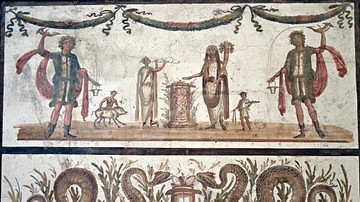
Article
Roman Household Spirits: Manes, Panes and Lares
To the ancient Romans, everything was imbued with a divine spirit (numen, plural: numina) which gave it life. Even supposedly inanimate objects like rocks and trees possessed a numen, a belief which no doubt grew out of the early religious...

Image
Pompeii Fresco with Lares
Fresco depicting two Lares (protective deities, sons of the god Mercury) pouring wine from a drinking horn (rhyton) into a bucket (situla). They stand on either side of a scene of sacrifice. The head of the family makes offerings, a musician...
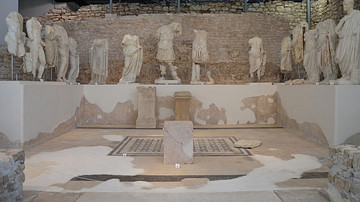
Definition
Roman Imperial Cult
The Roman imperial cult was the practice of venerating Roman emperors and their families as having divine attributes, honoring their contributions to the spread of Roman religion and culture. It was instituted by the first Roman emperor Augustus...

Video
Temple of the Nymphs - Ancient Rome Live (AIRC)
The temple remains visible on the Via delle Botteghe Oscure were discovered during the 1930s CE urban renewal project. The two columns were re-erected in the 1950s CE on the temple podium. The column drums are travertine, faced with stucco...

Definition
Kikimora
Kikimora (pronounced Kih-kee-mora) is a female house spirit from Slavic lore who can be helpful or malevolent depending on the behavior of the homeowner. In differing versions of her stories, there are two kinds of spirit, one generally helpful...
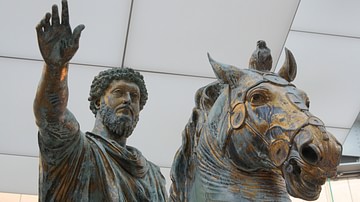
Definition
Roman Sculpture
Roman sculpture blended the idealised perfection of Classical Greek sculpture with a greater aspiration for realism. It also absorbed artistic preferences and styles from the East to create images in stone and bronze which rank among the...

Definition
Mercury (Deity)
Mercury (Mercurius) was the Roman god of commerce, often serving as a mediator between the gods and mortals, his winged feet giving him the advantage of speed, and so was the patron of circulation in general - of people, goods and messages...
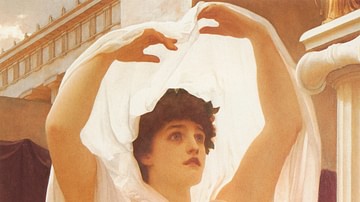
Definition
Vesta
Vesta was the goddess of the hearth, the home, and domestic life in the Roman religion (idenitified with the Greek goddess Hestia). She was the first-born of the titans Kronos and Rhea and, like the others, was swallowed by her father. When...

Article
Ancient Roman Society
Rome began as a small city on the banks of the Tiber River in Italy. The Latin tribes (also known as the Latini or Latians) inhabited the region c. 1000 BCE but the founding of the city is dated to 753 BCE. The family was the center and foundation...
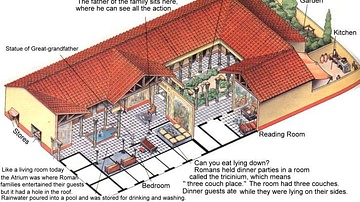
Article
The Roman Domus
The Roman domus was much more than a place of dwelling for a Roman familia. It also served as a place of business and a religious center for worship. The size of a domus could range from a very small house to a luxurious mansion. In some...